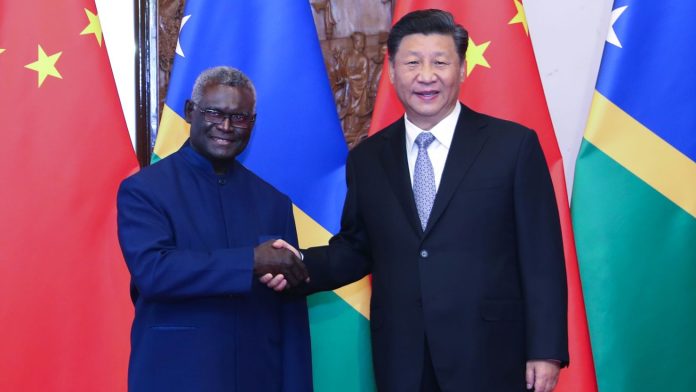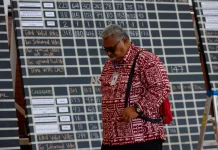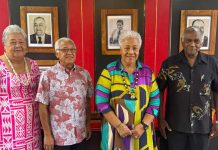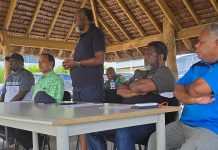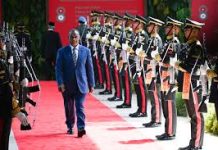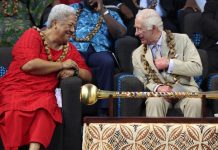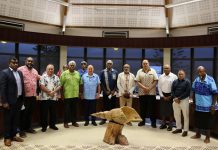The Solomon Islands’ ruling party has pledged to strike a “pragmatic” balance between stronger ties with China and its relations with “traditional partners” such as Australia if it wins re-election in April.
The Pacific nation’s Prime Minister Manasseh Sogavare has taken a pro-Beijing stance since returning to power in 2019 and has accused “agents of Western powers” of trying to bring down his government.
Since then, he has severed diplomatic ties with Taiwan to align with Beijing, and in 2022 he signed a security pact with China that drew concerns from Western countries about Beijing’s growing military footprint in the region.
But diplomatic analysts warned that drawing too close to China could result in a domestic backlash, as well as from other countries in the Pacific and the United States.
On Tuesday, the ruling Ownership, Unity and Responsibility Party said it would seek to benefit from the opportunities offered by China’s Belt and Road Initiative but also Australian infrastructure funding.
“The party will strengthen relationships with China through a ‘look North’ foreign policy, while nurturing ties with other traditional partners such as Australia,” it said.
“[Sogavare ] emphasised that as a party, we are committed to the ‘friends to all and enemies to none’ stance.”
In December, Sogavare had told parliament the country was at the centre of a “geopolitical war” between China and Western powers, which are vying for influence in the Pacific.
He accused the U.S of having a “geopolitical superiority complex” and said Chinese investments could help break his country’s reliance on foreign help, adding: “We must wake up. Those days are over.”
Sogavare who has been in and out of office on several occasions since 2000 is seeking a fifth term in office when the country heads to the polls in April.
“Sogavare’s policy hasn’t changed. He has wrapped his arms around [China] while maintaining links with Africa,” said Alan Tidwell, director of the Centre for Australian, New Zealand and Pacific Studies at Georgetown University. “It’s just a recognition of the reality on the ground.”
He added that Sogavare’s strategy on China was intended to bolster his position as a leader who could deliver for his supporters.
China is the Solomon Islands’ largest trading partner and it became the second-biggest official development assistance donor in 2021, according to Australian think tank the Lowy Institute.
Corey Lee Bell, a researcher at University of Technology Sydney’s Australia-China Relations Institute, suggested that Sogavare’s China policy might have stemmed from concerns over sovereignty, particularly involving Australia, its traditional security partner.
“His approach … has focused on not letting needed economic and security assistance from more powerful nations translate into undue influence,” he said.
This strategy has seen Sogavare practise a sort of “dynamic equa-distancing or playing on geostrategic competition and leaning at different times, or in different ways, between Australia and China”.
He cited the Pacific Games, where both Australia and China helped with the policing “in ways that slightly resemble a bidding war”.
He said other countries had also tried to balance relations with China while cooperating with Australia, for example East Timor.
He also said Fiji had been running a similar policy to the Solomons’ “look north” approach since 2006 as it looked for partners beyond Australia and New Zealand, but said its closer relations with China had brought problems of its own.
Among the events which soured ties between Fiji and China was an incident in 2017, when Chinese detectives arrested Chinese nationals suspected of running internet scams and took them back by plane, showing little respect for the island’s procedures and laws.
“Sogavare will probably know that if he gets too close to China, the threat from domestic opponents raising similar concerns about agency will increase, as has been a pattern in the Pacific over the last few years,” Bell said.
He added: “While no one will oppose Sogavare’s efforts to pursue economic opportunities through partnerships with China, he will face not only domestic pressure to keep [him] from getting too close to Beijing on the security front, and pressures from Australia and Washington, but he will also likely face pressures from other Pacific island countries.”
He also said that other countries in the region “may be benefiting from strategic competition, but they want to keep a lid on it – they don’t want to stoke tensions so that strategic competition becomes too high-stakes” and get sucked into great power competition.
Bell said he expected Washington and Canberra – who are used to Sogavare’s “robust language” – to “sit down and chat” if he is re-elected but would set out a clear red line: that they did not want anything close to a permanent Chinese military base or presence.
“As long as that is observed by Honiara [the Solomon Islands’ capital], and I don’t see why it wouldn’t be, there will be plenty of room for a renegotiation of its relationships with Canberra and Washington,” he said.
“If we go on precedent, Sogavare will lean towards China but probably continue engaging with Australia, who on precedent, will also seek to resell or upgrade their support in response to Sogavare’s recalibration,” he said.
SOURCE: SCMP/PACNEWS





